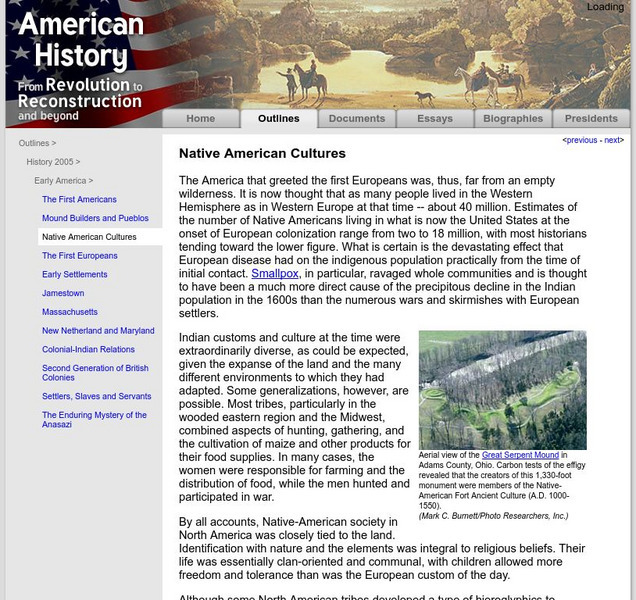Curated OER
Quilts, Warmth with History
Learners examine numerous quilts that show the culture and history of Nebraska. Using the internet, they view quilts from different points in history and discuss them as a class. They examine the role quilts play in discovering...
Curated OER
Baga Drum
Students examine a Baga Drum in order to explore the history of the Baga people of West Africa. In this art history lesson, students recognize figures used in Baga Drum design that represent aspects of Baga culture. They also design and...
Curated OER
History-5 Word Search
In this literacy worksheet, students find the words that are in the word search puzzle that focus upon the vocabulary that is from the theme of the sheet.
National First Ladies' Library
Government: Defending the Bill of Rights
Pupils examine the proposition of a country without the Bill of Rights. In a role-playing activity, teams of students gather information to build a case for retaining the Bill of Rights and present it before their congressperson.
Curated OER
Sparta and Athens
Sixth graders study Ancient Greece. In this Ancient Greece lesson plan, 6th graders complete 16 lessons to learn about Ancient Greece. Students complete a quiz for assessment.
Curated OER
America's First Pictures
Fifth graders visit the Smithsonian website to search online for early photo archives about life in the mid-nineteenth century.
Curated OER
Domains Portrayed and Invaded
Students examine the art and work of Carl Runguis. After reading a play, they discuss how an artist portrays his feelings about a topic in his work. They view the preplay and write an essay reflecting on their experiences. They also...
Curated OER
Children's Books
Students explore daily dilemmas students face. They write and illustrate a story book dealing with one dilemma. Students write reviews of their books. They read their books to second grade students. Additional cross curriculum activities...
Curated OER
C¿¿sar Ch¿¿vez, Organizes the Farm Workers Association - Act I, Scene I "The House Meeting"
Eleventh graders analyze the development of federal civil and voting rights for minority groups. In groups, they discuss how Cesar Chavez organized the farm workers and the techniques he used when protesting. They define and practice...
Curated OER
Carolina Gold and the Gullah
Eighth graders investigate the physical geography of South Carolina to explore how it was suited for growing rice. They examine how slave labor contributed to a plantations success and compare Gullah culture from now to the past.
Curated OER
Cotton Production and Milling
Students examine cotton production and milling. They compete in a hand-ginning contest to realize how difficult it was to separate the seeds from the fibers of cotton. They discuss why Eli Whitney's cotton gin was an important invention.
Curated OER
Hull of a Ship
Fifth graders engage in this introductory unit lesson. A bulletin board for the unit be started, Colonial Notebooks be presented to each student, and a pre-test on colonization be administered.
Curated OER
Web Wilderness
Fourth graders write an expository paper using notes taken during a field trip or a guest speaker.
Curated OER
Australian Travel Adventure
Seventh graders are introduced to the states and territories within Australia. Using the internet, they bookmark sites and take notes on what they want to share with their classmates. They also complete a map study on the country to...
Curated OER
Niagara Falls Reading Comprehension Passage
In this reading comprehension worksheet, student read a short passage about Niagara Falls before answering 6 multiple choice comprehension questions.
Curated OER
Prairie Voices: Where People Come From
Students examine the human experience. In this migration lesson, students determine reasons for migration, discover the traits of cultural groups, and explore how groups of people come to share their experiences despite language,...
Curated OER
Tolerance Quilt
Fifth graders read stories about giving and poverty and discuss why it is important to give to others. In this giving lesson plan, 5th graders make quilts to give to those in need.
University of Groningen
American History: Outlines: Native American Cultures
The America that greeted the first Europeans was, thus, far from an empty wilderness. It is now thought that as many people lived in the Western Hemisphere as in Western Europe at that time -- about 40 million. Estimates of the number of...
CommonLit
Common Lit: Text Sets: Native American History
This is a collection of 27 Grade-Leveled texts (4-12) on the topic Native American History. Before European settlers came to North America, millions of native people lived in many unique societies. Explore the history of Native Americans...
PBS
Pbs: The War: Native Americans
At the online companion site of the PBS documentary series "THE WAR," read a brief biography of the last Crow war chief, hear his words, and see photographs of other Native Americans in World War II.
A&E Television
History.com: Native American History Timeline
Before Christopher Columbus came to America, the expansive territory was inhabited by Native Americans. Throughout the 16th and 17th centuries, as more explorers sought to colonize their land, Native Americans responded in various...
A&E Television
History.com: Native American History Timeline
As explorers sought to colonize their land, Native Americans responded in various stages, from cooperation to indignation to revolt. The timeline begins in 1492 with the arrival of Christopher Columbus and ends on March 15, 2021:...
Other
Army: Native Americans in the u.s. Army: Code Talkers
During World War I and World War II, Native Americans from various tribes worked to keep American military communications secret through the use of tribal languages as code. Learn how these individuals worked to create codes that the...
Sam Houston State University
Shsu: Native Americans in World War Ii
Information about the roles of Native Americans in World War II and their service in the armed forces and defense industries.




















